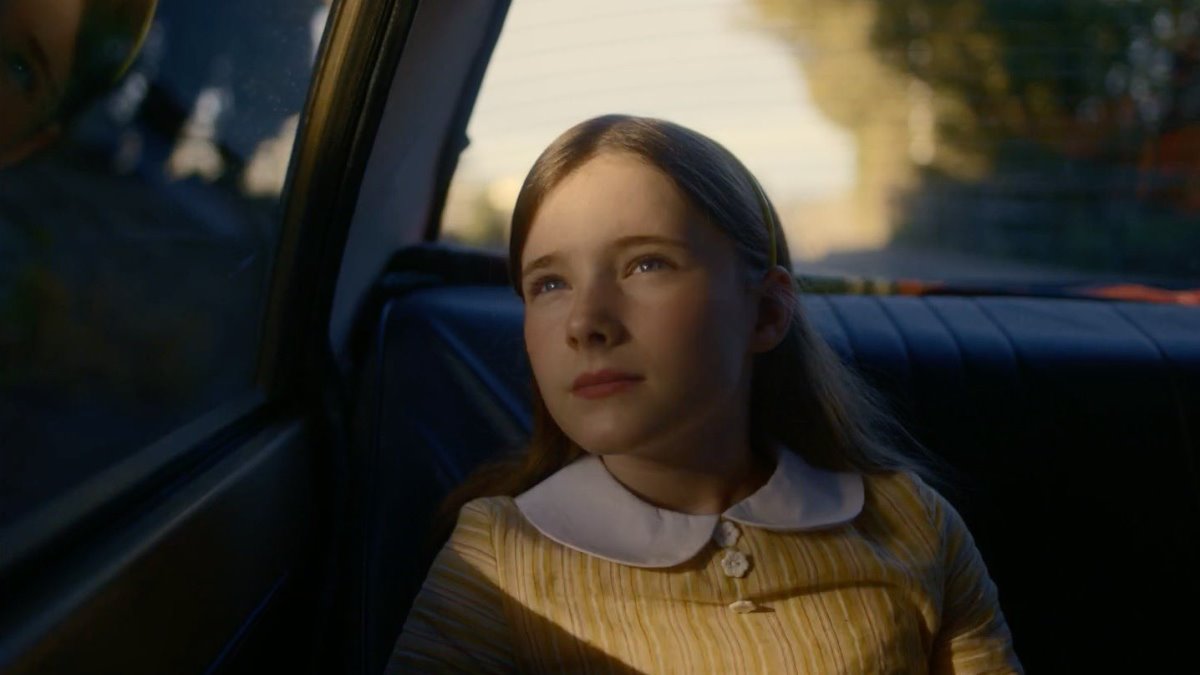“The Quiet Girl” (2022) – “If you were mine, I’d never leave you in a house with strangers.” – Eibhlin (Carrie Crowley)
As director/writer Colm Bairead’s movie opens, it’s springtime in 1981, and Cait (Catherine Clinch), a bashful nine-year-old, lives in a bustling home but one without radiant, productive energy. Cait lives with a few sisters and her parents (Michael Patric and Kate Nic Chonaonaigh). Her mom (Chonaonaigh) is expecting a baby boy in a few months, towards the end of the summer. However, downtrodden moods linger within these dreary walls that perch on a foundation of regrets.
If any love exists in this remote farmhouse, it’s suffering on life support and hidden within a random crack in a forgotten closet. Rather than boldly rise in stark opposition to her dismal surroundings, this thin, shy auburn-haired lass has absorbed nearly a decade of apathy and neglect. Cait suffers in silence, struggles in school, and lives in fear of her father, a man who frequently gambles, drinks, and complains. A trifecta of gloom and doom.
Dan (Patric) never raises his voice (except, perhaps, when he loses a wager). The man speaks softly while delivering barbs, insults, and jabs. For some reason, he directs nearly all of them at Cait, as if she was the sole cause of his lifetime of disappointments.
However, life for Cait – suddenly – takes a positive turn. With a houseful of mouths to feed and a baby on the way, Cait’s parents ship their “problem child” to another locale. Eibhlin, a cousin who lives three hours away by car, and her husband Sean (Andrew Bennett) will look after Cait for the summer. Eibhlin and Sean also run a farm, a dairy farmstead, and a relatively successful one, judging by their beautiful, warm home.
They are an older, childless couple – in their 40s or 50s – and Eibhlin becomes instantly keen on Cait, doting on her from the get-go. Meanwhile, Sean isn’t unkind, but he seems distant, like someone with fifty bricks strapped to his back, expending his entire daily exertion to keep his back upright for dignity’s sake. The man could converse politely with their new houseguest, but the burden of his work prevents him from devoting more than a few words to Cait each day.
Although, the emotional load may stem from somewhere else.
Bairead weaves a straightforward tale – an adaptation of Claire Keegan’s 2010 88-page novella, “Foster” – of two starkly different households that directly speaks to the impact of parental love towards a child. Specifically, “The Quiet Girl” contrasts the disconcerting damage when the aforementioned intention is missing and the blossoming wonder and joy when it endures.
With a 94-minute runtime, Bairead and the cast don’t spend precious minutes with extraneous subplots and winding directions. Most of the film basks on the two family properties, bastions for their respective opposing outlooks. Admittedly, a majority of the activity occurs at Cait’s new summer home as the story eases into a hopeful transformation for the young girl, a child born into a destiny of self-doubt. Perhaps, 10 short weeks with Eibhlin and Sean can change Cait’s fortunes, but can one season course correct years of disregard? Especially when Sean provides a sturdy roof and food on the kitchen table but little else, at least during the first act.
“The Quiet Girl” delivers its messages, not with lengthy exposition but with actions. Bairead doesn’t tell us. He shows us through simple gestures.
For instance, Eibhlin brushes Cait’s hair with 100 strokes while counting along the way, and she takes Cait shopping for new clothes, as our interim matriarch looks tenderly towards a child who seems to have never worn original apparel in her life.
Bairead and Crowley make Eibhlin’s kind intentions clear from the get-go. Therefore, the story’s fulcrum pivots with Sean and Cait’s rapport, a non-existent one at first. The question is: Will Sean set aside his invisible bricks and turn towards this vulnerable and broken spirit?
This discreet review will not reveal this arc’s treasured details, but let’s say that the disparity between Dan (and his villainous nature) and Sean assuredly grows, as audiences may very well become captivated and constantly hope for continued moments of kind gestures, ones that may seem modest, but they are colossal movements towards repair and healing.
Bairead and the film’s producers – including Cleona Ni Chrualaoi (who is Bairead’s wife) – made flat out brilliant casting choices. Crowley and Bennett exude accessible charisma and sympathy as two on-screen guardians that double as guardian angels. So much so, you’ll want to jump on a commercial flight to Ireland, stroll around their acreage, and enjoy a comforting supper topped with rhubarb pie. Conversely, Patric and Chonaonaigh project a distressing concoction of indifference and callousness.
The script draws clear divides between the Haves and Have Nots, however, Bairead laces the psychological and financial gulfs with irony because one couple is blessed with several children while the other longs for one.
Cinematographer Kate McCullough will also tempt audiences to book flights to the Emerald Isle. McCullough finds magical spots northwest of Dublin in County Meath, as towering, flourishing trees act as nature’s guides on country roads, and knotty wooden relics line walking paths that feel like we’re stepping into an ancient fable, even though Cait lives her childhood in the late 20-century.
Here, farmers nurse calves with hand-held bottles while birds chirp, and casual hikes on lush grasslands under blue skies can last until 9:30 pm. Meanwhile, composer Stephen Rennicks skillfully drops gentle melodies to instantly stir smiles or cause tears at just the right moments as we follow Cait on her journey to possible salvation.
Catherine Clinch successfully carries the weight of this Oscar-nominated Best International Film on her slender shoulders. Clinch’s Cait encompasses naivety, insecurities, and post-traumatic stress. The movie could not work without this young actress communicating these painful feelings and letting them fall when Cait faces love and care.
Oh, Catherine almost entirely accomplishes this feat through non-verbal cues.
⭐⭐⭐ 1/2 out of ⭐⭐⭐⭐
Directed by: Colm Bairead
Written by: Colm Bairead, based on Claire Keegan’s novella
Starring: Catherine Clinch, Carrie Crowley, Andrew Bennett, Michael Patric, and Kate Nic Chonaonaigh
Runtime: 94 minutes
Rated: PG-13
Image credits: Break Out Pictures







